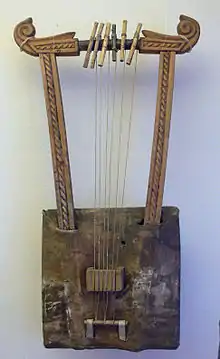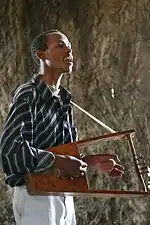Krar
The krar ( ክራር in Tigrinya,Tigre and Amharic), kirar, kerar, kraar is a five- or six-stringed bowl-shaped lyre from Eritrea[1] and Ethiopia. It is tuned to a pentatonic scale. A modern krar may be amplified, much in the same way as an electric guitar or violin.
 A wooden krar. | |
| String instrument | |
|---|---|
| Classification | lyre |
| Developed | Eritrea |
| Related instruments | |
| masenqo | |
| Musicians | |
| Awet | |
| Builders | |
| Awet | |
Features

A krar player from Ethiopia
A chordophone, the krar is usually decorated with wood, cloth and beads. Its five or six strings determine the available pitches. The instrument's tone depends on the musician's playing technique: bowing, strumming or plucking. If plucked, the instrument will produce a soft tone. Strumming, on the other hand, will yield a harmonious pulsation.
A krar is often played by musician-singers called azmari. It usually accompanies love songs and secular songs.
Resources
- Asnakech Worku, Ethiopiques 16: The Lady with the Krar (compact disc). Buda Musique 822652, 2003.
- Ethiopie, chants d'amour (Ethiopia, Love Songs). Fantahun Shewankochew, vocals and krar (compact disc). INEDIT/Maison des Cultures du Monde W260080, 1998.
Films
- HELP! – Musikalische Geschichten aus Äthiopien. Directed by Daniel Schulz.[2]
See also
References
| Wikimedia Commons has media related to Krar. |
This article is issued from Wikipedia. The text is licensed under Creative Commons - Attribution - Sharealike. Additional terms may apply for the media files.
